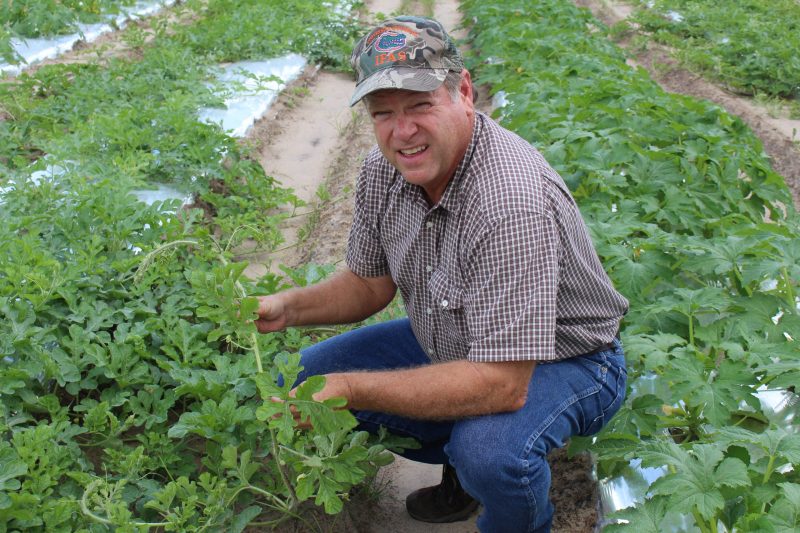Bob Hochmuth, Regional Specialized Extension Agent- Vegetable Crops, with input from Suwannee Valley Extension Agents: Mark Warren (Levy), Tyler Pittman (Gilchrist), Tatiana Sanchez-Jones (Alachua), Luke Harlow (Bradford), Dan Fenneman (Madison), Keith Wynn (Hamilton), Emily Beach (Lafayette), Jim Devalerio (Union), De’Anthony Price (Jefferson), Raymond Balaguer(Suwannee), Kevin Athearn (RSA-Agri- business), Shivendra Kumar (RSA-Agronomic Crops), and Jay Capasso (RSA- Water Resources).
2024 Season Summary
-

Bob Hochmuth, UF/IFAS Regional Specialized Extension Agent, evaluating nutrient status in a Suwannee Valley watermelon grower’s field.
The 2024 season was only a few days behind the fast pace to first harvest in 2023.
– - The market prices certainly did not hold high as in 2023, but 2024 may be more “normal” in many respects. Hopefully, early season medium to high prices lasted long enough to help profits.
– - We had a very clean crop early in the season, but things really changed about May 1st and we ended up with every disease typical in watermelons.
– - Gummy stem blight stands out as the most persistent and widespread disease of all. Gummy stem blight was very persistent, and we have concerns regarding not being able to manage it better with our traditionally good spray materials.
– - Getting away from broad spectrum fungicides like chlorothalonil (Bravo) too early this season appears to have been a major mistake, as the more narrowly targeted fungicides ran into restrictions of maximum seasonal use and in some cases reduced control.
– - Fusarium wilt was again a serious problem in many fields. We expect to learn a lot about the benefits and challenges of grafted watermelon use to better manage Fusarium wilt, as we had significant acreage of grafted watermelon plants in 2024.
– - Early preventative sprays, although expensive, targeted at downy and powdery mildew seemed to work well overall.
– - A few cases of early season challenges remind us to always monitor and document plant health in transplants upon arrival. Avoid any signs of leaf spots, flowers, or stunting or other concerns. We know transplants can look clean as a whistle and still show fruit blotch, gummy stem blight or other problems by the middle or end of the season.
– - 2024 was not a serious rindworm year. Very few reports of major problems here. Again, early cover sprays worked very well.
– - The unfortunate migrant worker tragedy near Ocala will be remembered for many years to come. Our prayers continue to be with those families who lost loved ones on that fateful morning.
– - The difficulties in getting H-2A workers this year also created many labor challenges early in the season. Hopefully the issues will be resolved in future seasons.
– - Several farmers installed irrigation automation this year with cost-share support and with a steep learning curve in some instances. About 2000 acres adopted new automation systems in 2024 and when added to the few hundred acres already using automation, over 25% of the acreage is now using some type of automation control. This effort has been led by Tyler Pittman with funding support from FDACS Mini-grant program. We are all positive this is the future for us in this region.
– - Research trials and demonstrations with WestRock paper mulches went very well, especially with nutsedge control. Trial data will be summarized as the season is completed.
– - Over 5,500 acres of watermelons were petiole-sap tested by Extension agents weekly providing fine tuning to weekly fertigation events. Several fields were also tested for irrigation uniformity, likewise with the goal of fine-tuning irrigation delivery. These projects are supported by funding from both FDACS Office of Ag Water Policy and the Suwannee River Water Management District.
Note: Our 2024 Suwannee Valley Watermelon Institute will be held on December 5th, 2024, in Fanning Springs. See you there!
–
I want to thank the Suwannee Valley Extension Agents, my co-authors, for their consistent supply of great info to be summarized in the weekly reports. I feel like our Suwannee Valley Extension Watermelon Team is the best regional Extension effort in the country. This bunch cares about the success of “their” growers.
We want to send a special thanks to the 2024 sponsors of our Watermelon Rapid Diagnostics Program including Valdosta Plant Company, Mayo Ag Services, Gowan USA, Harrell’s Fertilizer, Triest Ag, Syngenta Crop Protection, WestRock Paper Company, Orbia Netafim, and Super Sweet Farms. This group has provided funding for nearly 100 diagnostic samples. These results are crucial to our weekly notifications, and the basis for our spray recommendations each week. Thanks to these sponsors for supporting this effort and realizing the importance of this “big picture” type of program aimed at helping everyone. We also thank those private industry consultants and chemical & fertilizer company reps for engaging with us at UF to keep things on the cutting edge. Thanks to everyone.
- 2024 Watermelon Season Wrap Up - June 21, 2024
- Weekly Watermelon Update – June 3 - June 7, 2024
- Weekly Watermelon Update #10 – May 20 - May 24, 2024
